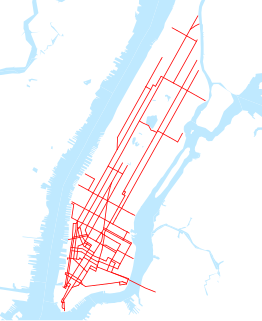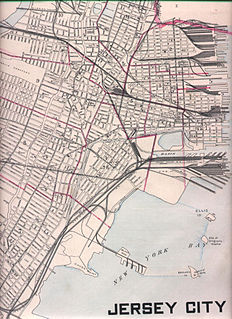
A corporation is an organization—usually a group of people or a company—authorized by the state to act as a single entity and recognized as such in law for certain purposes. Early incorporated entities were established by charter. Most jurisdictions now allow the creation of new corporations through registration. Corporations come in many different types but are usually divided by the law of the jurisdiction where they are chartered based on two aspects: by whether they can issue stock, or by whether they are formed to make a profit. Depending on the number of owners, a corporation can be classified as aggregate or sole.
Standard Oil Company, Inc., was an American oil production, transportation, refining, and marketing company that operated from 1870 to 1911. At its height, Standard Oil was the largest petroleum company in the world, and its success made its co-founder and chairman, John D. Rockefeller, one of the wealthiest Americans of all time and one of the richest people in modern history. Its history as one of the world's first and largest multinational corporations ended in 1911, when the U.S. Supreme Court ruled that it was an illegal monopoly.

A transcontinental railroad or transcontinental railway is contiguous railroad trackage, that crosses a continental land mass and has terminals at different oceans or continental borders. Such networks can be via the tracks of either a single railroad or over those owned or controlled by multiple railway companies along a continuous route. Although Europe is crisscrossed by railways, the railroads within Europe are usually not considered transcontinental, with the possible exception of the historic Orient Express. Transcontinental railroads helped open up unpopulated interior regions of continents to exploration and settlement that would not otherwise have been feasible. In many cases they also formed the backbones of cross-country passenger and freight transportation networks. Many of them continue to have an important role in freight transportation and some like the Trans-Siberian Railway even have passenger trains going from one end to the other.

The Union Pacific Railroad, legally Union Pacific Railroad Company and often called simply Union Pacific, is a freight-hauling railroad that operates 8,300 locomotives over 32,200 miles (51,800 km) routes in 23 U.S. states west of Chicago and New Orleans. Union Pacific is the second largest railroad in the United States after BNSF, with which it shares a duopoly on transcontinental freight rail lines in the Western, Midwestern and Southern United States.
A civil township is a widely used unit of local government in the United States that is subordinate to a county, most often in the northern and midwestern parts of the country. The term town is used in New England, New York, and Wisconsin to refer to the equivalent of the civil township in these states; Minnesota uses "town" officially but often uses it and "township" interchangeably. Specific responsibilities and the degree of autonomy vary based on each state. Civil townships are distinct from survey townships, but in states that have both, the boundaries often coincide and may completely geographically subdivide a county. The U.S. Census Bureau classifies civil townships as minor civil divisions. Currently, there are 20 states with civil townships.

U.S. Bancorp is an American bank holding company based in Minneapolis, Minnesota, and incorporated in Delaware. It is the parent company of U.S. Bank National Association, and is the fifth largest banking institution in the United States. The company provides banking, investment, mortgage, trust, and payment services products to individuals, businesses, governmental entities, and other financial institutions. It has 3,106 branches and 4,842 automated teller machines, primarily in the Western and Midwestern United States. It is ranked 117th on the Fortune 500, and it is considered a systemically important bank by the Financial Stability Board. The company also owns Elavon, a processor of credit card transactions for merchants, and Elan Financial Services, a credit card issuer that issues credit card products on behalf of small credit unions and banks across the U.S.
The Public Service Enterprise Group (PSEG) is a publicly traded diversified energy company headquartered in Newark, New Jersey and was established in 1985 with a legacy dating back to 1903.

The Richmond and Danville Railroad (R&D) Company was a railroad that operated independently from 1847 until 1894, first in the U.S. state of Virginia, and later on 3,300 miles (5,300 km) of track in nine states.
Charter Communications, Inc., is an American telecommunications and mass media company with services branded as Spectrum. With over 26 million customers in 41 states, it is the second-largest cable operator in the United States by subscribers, just behind Comcast, and third-largest pay TV operator behind Comcast and AT&T. Charter is the fifth-largest telephone provider based on number of residential lines.

The Brooklyn City Railroad (BCRR) was the oldest and one of the largest operators of streetcars in the City of Brooklyn, New York, continuing in that role when Brooklyn became a borough of New York City in 1898.

The North American Company was a holding company incorporated in New Jersey on June 14, 1890, and controlled by Henry Villard, to succeed to the assets and property of the Oregon and Transcontinental Company. It owned public utilities and public transport companies and was broken up in 1946, largely to comply with the Public Utility Holding Company Act of 1935.
A statutory corporation is a government entity created as a statutory body by statute. Their precise nature varies by jurisdiction, thus, they are statutes owned by a government or controlled by national or sub-national government to the extent provided for in the creating legislation.

The New York Railways Company operated street railways in Manhattan, New York City, United States between 1911 and 1925. The company went into receivership in 1919 and control was passed to the New York Railways Corporation in 1925 after which all of its remaining lines were replaced with bus routes.
The American Can Company was a manufacturer of tin cans. It was a member of the Tin Can Trust, that controlled a "large percentage of business in the United States in tin cans, containers, and packages of tin." American Can Company ranked 97th among United States corporations in the value of World War II military production contracts. During its peak of productivity, the American Can Company employed up to 800 people from the surrounding neighborhoods. It was formerly a member of the Dow Jones Industrial Average from 1959–1991, though after 1987 it had renamed itself Primerica, a financial conglomerate which had divested itself of its packaging arm in 1986.

Charter International plc was a large British engineering business based in London. It was acquired by Colfax Corporation in January 2012.
The Puget Sound Shore Railroad and successor Northern Pacific and Puget Sound Shore Railroad built a branch line of the Northern Pacific Railroad between Puyallup and Seattle, Washington, U.S., and partially constructed a line around the east side of Lake Washington to Woodinville.
Louis K. Liggett Co. v. Lee, 288 U.S. 517 (1933), is a corporate law decision from the United States Supreme Court.

National Docks Secondary is a freight rail line within Conrail's North Jersey Shared Assets Area in Hudson County, New Jersey, used by CSX Transportation. It provides access for the national rail network to maritime, industrial, and distribution facilities at Port Jersey, the Military Ocean Terminal at Bayonne (MOTBY), and Constable Hook as well as carfloat operations at Greenville Yard. The line is an important component in the planned expansion of facilities in the Port of New York and New Jersey. The single track right of way comprises rail beds, viaducts, bridges, and tunnels originally developed at the end of the 19th century by competing railroads.
The history of corporate law in the United States concerns the development of the corporation, primarily as a business organization, under the different United States corporate law, including federal regulation.
National Westminster Bank USA, commonly known as NatWest USA, was a wholly owned subsidiary of National Westminster Bank in the United Kingdom from 1983 to 1996. Formed as the National Bank of North America in 1905, the US retail banking operation was sold to Fleet Financial Group in 1996.










